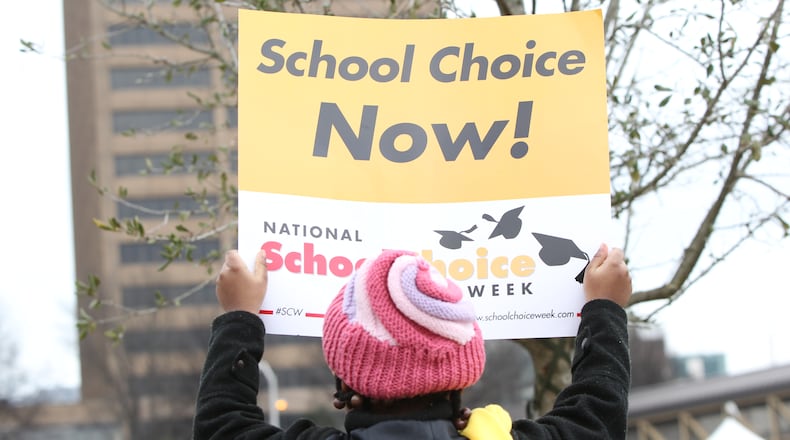David Mitchell is founder, CEO and president of Better Outcomes for Our Kids or BOOK. A new Atlanta-based nonprofit, BOOK seeks to educate the African-American community about school choice options, including traditional public schools, public charters, virtual schools, home schools and vouchers.
In this piece, Mitchell criticizes a recent resolution passed by the membership of the National Association for the Advancement of Colored People calling for a moratorium on privately managed charter schools. The resolution, which has to be approved by the NAACP board in the fall, expresses concern over discipline, increased segregation and financial mismanagement in such charter schools.
A similar resolution was approved by the Movement for Black Lives.
Georgia has a mix of charter schools, including some overseen by school districts. However, the growth nationwide is among privately managed charter schools. Many critics consider private charter management a back door attempt to privatize public schools.
"The denial of quality education has long been used to oppress people of color and we shall not be fooled into believing that privately run corporations will use taxpayer money to provide all with a quality education when it goes against their bottom line. The NAACP shall not be swayed by those in the black community that have been bought by charter corporations to peddle their toxic brand of school choice," said Denisha Jones, a board member of the national Badass Teachers group and a professor of education at Trinity Washington University.
With that background, here is Mitchell's essay opposing the NAACP resolution.
By David Mitchell
I must admit, I was somewhat confused after hearing the National Association for the Advancement of Colored People is seriously considering passing a resolution to ban any new nonprofit-managed, public charter schools.
When I read it I thought to myself, “This has to be a mistake!” I have been trying to wrap my head around what this means for the “advancement of young colored people” in America, as it relates to public education. The school choice movement was born to allow innovation, flexibility, accountability, and community involvement in our public schools. This sounds like a movement that the NAACP would have founded itself.
So I ask myself, “How is the NAACP missing the point when it comes to school choice?”
In 2012, my wife and I found ourselves in a quandary when our twins finished Pre-K. When we visited our zoned school, a traditional public school in our neighborhood, we found challenges on every level. The campus was “falling apart,” and the school ranked near the bottom of all public schools in Georgia. After that visit, I realized I had no idea what my options were, but had two, young “colored people” counting on me to “advance” their education.
Through a chance meeting between my wife and a community leader recruiting board members for a public charter school in our neighborhood, my wife was able to tour a school that was actually closer to our home than our zoned school. After the visit, she took an appointment on the board, which gave my two little “colored people” automatic admittance. This option has changed the direction of my children’s educational future, in ways that cannot be measured. I honor the mission of the NAACP, but I believe charter schools were birthed from the outcries of parents wanting more choices and better options for their children. This alone is enough of a reason to give serious consideration to not pass a regressive resolution to ban new public charter schools.
During the 2014-2015 school year, there were 83,277 Georgia students enrolled in charter schools. Roughly 40 percent of students enrolled in charter schools are black, 40 percent are white, 10 percent are Latino, and 3 percent are Asian. Clearly, parents want school options for their children.
For the 2014-15 school year, there were an estimated 9,083 students on waiting lists throughout Georgia for a charter slot. Given that 53 percent of Georgia students attending public charter schools are “young colored people,” what is the NAACP saying to these families seeking better outcomes for their kids?
We can all agree that ultimately “the ball has been dropped.” But eliminating options, and telling families and communities to be comfortable with status quo, is definitely not the answer.
There is no conspiracy to privatize public education, but I do believe there is an aggressive plan to help those schools that need help and put programs in place to guarantee successful outcomes for all public schools. I believe with the right environment, all children can learn based on their God-given abilities and gifts, and Better Outcomes for Our Kids was founded on that premise. BOOK believes we have fallen victim to being spectators instead of the spark that invigorates, educates, and advocates for our young “colored people” when it comes to public education.
BOOK is proud to have the support of Ambassador Andrew Young, former mayor of Atlanta and chief of staff for Dr. Martin Luther King. "Until public schools are able to deal with all of the diversity of our population, we need public charter schools to give special opportunities for children who need individual attention and approaches, and I'm not talking about rich children," said Young.
While I support what the NAACP stands for and what it has meant to the African-American experience, maybe the resolution should focus on helping families and communities become more involved in our public schools rather than eliminating options. When it comes to public charter schools and school choice, it seems the NAACP has missed an opportunity.
About the Author
Keep Reading
The Latest
Featured



